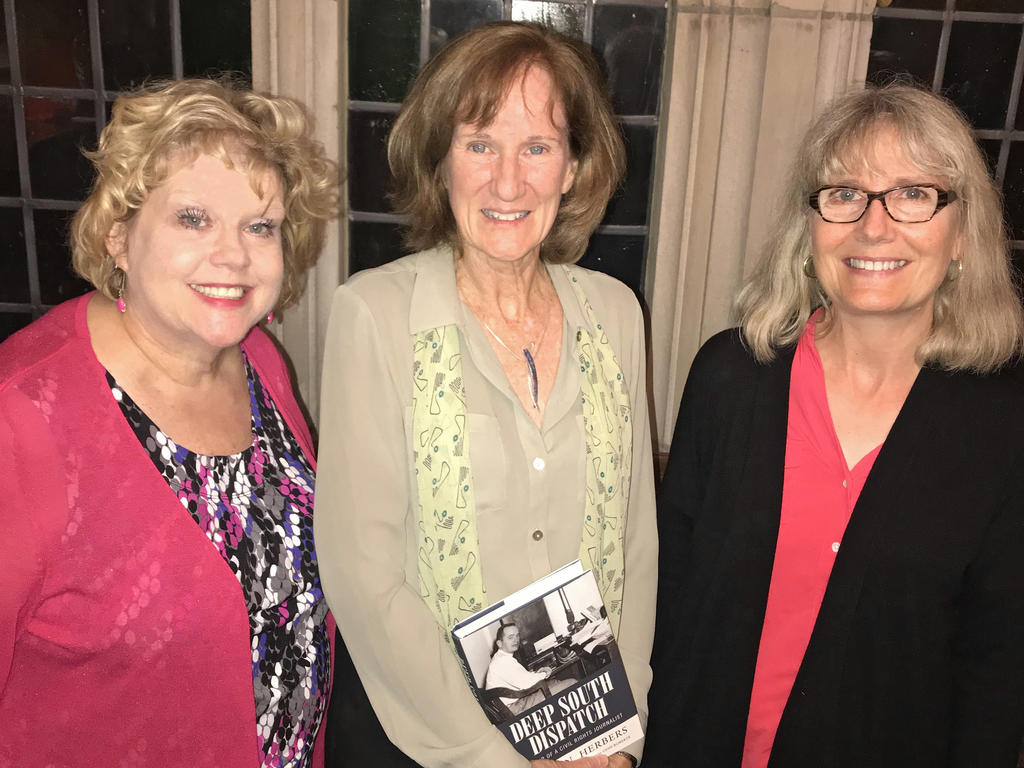Journalist, educator, and Rhodes alumna Anne Farris Rosen ’78 recently gave a talk on campus about her career and new book chronicling the career of her late father, John Herbers, who became one of the pivotal chroniclers of the Civil Rights Movement in the 1960s.
“Anne Farris Rosen reminded us of the importance of lifelong learning and engaged citizenship,” said Dr. Charles Hughes, director of Rhodes’ Lynne and Henry Turley Memphis Center, which sponsored the talk. “Through discussing her father’s work and her own storied career, and tracing a pathway from Rhodes College to the world, she inspired us to think critically and passionately about the world and community around us.”
Rosen’s book with her father, Deep South Dispatches: Memoir of a Civil Rights Journalist, was released this year by the University Press of Mississippi. In a discussion after the talk, Rosen told Rhodes communications staff, “My father wrote his memoir 20 years ago, but it was unfinished and relegated to the bottom drawer of a file cabinet in his office. I came across it 10 years ago, dusted it off, and suggested to him that we finish the work. After working off-and-on with him for 10 years, we finished Deep South Dispatch in 2016 before he died in March 2017 at the age of 93. In order for me to draft the second half, I surveyed more than 600 of the articles he had written between 1949 and 1965 and did extensive research on this period. We worked elbow-to-elbow to complete the manuscript, and it was a true labor of love.”
Herbers covered the Civil Rights Movement for more than a decade, including Emmett Till’s murder trial, the assassination of John F. Kennedy, the Birmingham bombings, the Selma campaign for voting rights, Dr. Martin Luther King, and the Freedom Summer murders in Philadelphia, MS. In addition, he became a national reporter for The New York Times covering presidential campaigns, Vietnam protests, race riots in American cities, and six presidents including Richard Nixon and Gerald Ford. He wrote The New York Times front page article “Nixon Resigns.”
“I’ve dubbed my father the Forest Gump of journalism because he was present at many major historic events in contemporary America,” said Rosen. “He was my mentor and greatest teacher even before I planned to become a journalist. Fortunately, he took me with him on many assignments even when I was a young child. At age five, I accompanied him to a civil rights rally . . . He and I were teargassed on the lawn of the U.S. Capitol during a Vietnam march, and I typed the final manuscript for one of his books while I was in college.”
Rosen majored in English at Rhodes— then Southwestern at Memphis— and decided she wanted to become a journalist while writing for the college newspaper, The Sou’wester. She considered transferring to a school that offered a journalism major, but her father suggested that she remain at Rhodes and said, “You will rarely get four uninterrupted years again to learn history, literature, art, science, philosophy that will prepare you for life. Stay and learn those lessons of the world. It will make you a well-rounded, more interesting person. And you can learn the skills of a trade later when you are working a job.”
After graduating from Rhodes in 1978 with a bachelor of arts degree, Rosen did launch her career as a journalist covering politics, government, legal affairs, and social issues at the international, national, and local levels. She has written for The New York Times, The Washington Post, and the Pew Research Center. She also has worked as an off-camera reporter for London-based documentary film production companies and has taught courses at the University of Maryland’s Philip Merrill College of Journalism. She is the recipient of the Associated Press Managing Editors and Best of Gannett awards, among others.
“I took my father’s advice, and while there were moments when I initially could have used a bit more training as a journalist, I acquired a breadth of knowledge that I have carried with me for a lifetime to any occupation. And I think it enabled me to have a more fruitful career as a journalist,” said Rosen.
